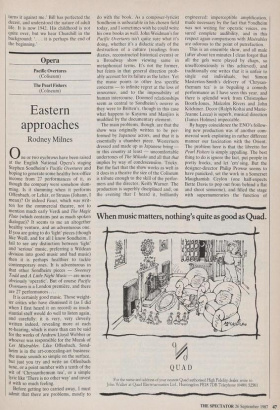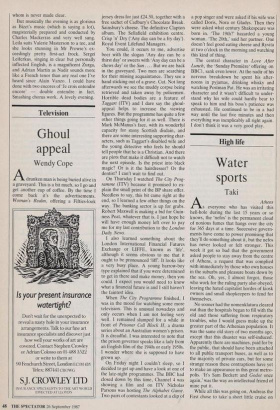Opera
Eastern approaches
Rodney MIInes
One or two eyebrows have been raised at the English National Opera's staging Stephen Sondheim's Pacific Overtures and hoping to generate some healthy box-office income from 27 performances of it, as though the company were somehow slum- ming. Is it slumming when it performs Offenbach, or Lehar, or Strauss (Johann, I mean)? Or indeed Faust, which was writ- ten for the commercial theatre, not to mention much early Verdi and The Magic Flute (which contains just as much spoken dialogue)? It seems to me an altogether healthy venture, and an adventurous one If you are going to do 'light' pieces (though like Weill, and for all I know Sondheim, 1 fail to see any distinction between 'light' and 'serious' music, preferring a Wildean division into good music and bad music) then it is perhaps healthier to tackle contemporary ones. It is adventurous in that other Sondheim pieces — Sweeney Todd and A Little Night Music — are more obviously 'operatic'. But of course Pacific Overtures is a London premiere, and there are 27 performances....
It is certainly good music. Those weight- ier critics who have dismissed it (as I did when I first heard it on record) as insub- stantial stuff would do well to listen again, and carefully: it is very, very cleverly written indeed, revealing more at each re-hearing, which is more than can be said for the works of Andrew Lloyd Webber or whoever was responsible for the Muzak of Les Miserables. Like Offenbach, Sond- heim is in the art-concealing-art business: the music sounds so simple on the surface, but just you try and write an Offenbach tune, or a point number with a tenth of the wit of 'Chrysanthemum tea', or a simple lyric like 'There is no other way' and invest it with so much feeling.
Before getting too carried away, I must admit that there are problems, mostly to do with the book. As a composer-lyricist Sondheim is unbeatable in his chosen field today, and I sometimes wish he could write his own books as well. John Weidman's for Pacific Overtures isn't qUite sure what it's doing, whether it's a didactic study of the destruction of a culture (readings from diaries, reconstructed historical events) or a Broadway show viewing same in metaphorical terms. It's not the former, but feints in that general direction prob- ably account for its failure as the latter. Yet the music points to other less specific concerns — to infinite regret at the loss of innocence, and to the impossibility of human intercourse. Doomed relationships seem as central to Sondheim's oeuvre as they were to Britten's, though in this case what happens to Kayama and Manjiro is muddied by the documentary element.
The main problems, though, are that the show was originally written to be per- formed by Japanese actors, and that it is essentially a chamber piece. Westerners dressed and made up as Japanese bring in this country at least — uncomfortable undertones of The Mikado and all that that implies by way of condescension. Tricky. But the fact that the show works as well as it does in a theatre the size of the Coliseum is tribute enough to the skill of the perfor- mers and the director, Keith Warner. The production is superbly disciplined and, on the evening that I heard it, brilliantly engineered: imperceptible amplification, made necessary by the fact that Sondheim was not writing for operatic voices, en- sured complete audibility, and in this respect again comparisons with Miserables are odorous to the point of putrefaction.
This is an ensemble show, and all male (after about ten minutes I clean forgot that all the gels were played by chaps, so unselfconsciously is this achieved), and traditionally one writes that it is unfair to single out individuals, but Simon Masterton-Smith's delivery of 'Chrysan- themum tea' is as beguiling a comedy performance as I have seen this year, and there is splendid work from Christopher Booth-Jones, Malcolm Rivers and John Kitchiner. Decor (Ralph Koltai and Marie- Jeanne Lecca) is superb, musical direction (James Holmes) impeccable.
By happy coincidence the ENO's follow- ing new production was of another com- mercial work exploiting in rather different manner our fascination with the Orient. The problem here is that the libretto for Pearl Fishers is simply appalling. The best thing to do is ignore the fact, put people in pretty frocks, and let 'ern' sing. But the designer-director Philip Prowse seems to have panicked, set the work in a Somerset Maughamish Ceylon (one half-expects Bette Davis to pop out from behind a flat and shoot someone), and filled the stage with supernumeraries the function of whom is never made clear.
But musically the evening is as glorious as Bizet's music (which is saying a lot), magisterially prepared and conducted by Charles Mackerras and very well sung. Leila suits Valerie Masterson to a tee, and she looks stunning in Mr Prowse's ex- ceedingly pretty first-act frock. Sergei Leiferkus, singing in clear but personally inflected English, is a magnificent Zurga, and Adrian Martin as Nadir sounds more like a French tenor than any real one I've heard since Alain Vanzo. I could have done with two encores of `Je crois entendre encore' — double entendre in fact. Smashing chorus work. A lovely evening.































































 Previous page
Previous page